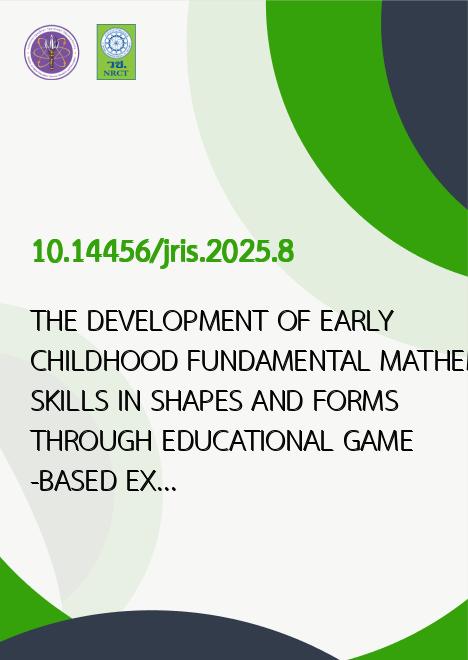
|
THE DEVELOPMENT OF EARLY CHILDHOOD FUNDAMENTAL MATHEMATICAL SKILLS IN SHAPES AND FORMS THROUGH EDUCATIONAL GAME-BASED EXPERIENCES |
|---|---|
| รหัสดีโอไอ | |
| Creator | Sutthida Wanna |
| Title | THE DEVELOPMENT OF EARLY CHILDHOOD FUNDAMENTAL MATHEMATICAL SKILLS IN SHAPES AND FORMS THROUGH EDUCATIONAL GAME-BASED EXPERIENCES |
| Contributor | Thipaugson Puttasarin, Warasporn Kehathan, Junjira Sansombat |
| Publisher | ห้างหุ้นส่วนจำกัด นวัตกรรมการเรียนรู้สร้างสรรค์ |
| Publication Year | 2568 |
| Journal Title | Journal of Research and Innovation for Sustainability (JRIS) |
| Journal Vol. | 2 |
| Journal No. | 2 |
| Page no. | 16-28 |
| Keyword | Early childhood, Mathematical skills of Shapes and form, Educational games activities |
| URL Website | https://so17.tci-thaijo.org/index.php/JRIS |
| Website title | Journal of Research and Innovation for Sustainability |
| ISSN | 3056-9397 |
| Abstract | This research aims to investigate the development of fundamental mathematical skills related to shapes and forms in early childhood through educational game-based experiences. The objectives of the study are: 1) to enhance early childhood mathematical shape and form skills through the implementation of educational game-based experiences, and 2) to compare early childhood mathematical shape and form skills before and after participating in educational game-based experiences. The sample group consisted of 31 male and female early childhood students, aged 5–6 years, enrolled in Kindergarten 2/3 during the first semester of the 2024 academic year at Municipal School 1 (Wittayanaree), under the jurisdiction of Chaiyaphum Municipality. The participants were selected using purposive sampling. The research instruments included: 1) 24 educational game-based activity plans and 2) a mathematical shape and form skills assessment for early childhood students. The study employed a One-Group Pretest-Posttest Design. Data analysis was conducted using mean scores, standard deviations, and a dependent t-test. The findings revealed that the overall fundamental mathematical shape and form skills of the 31 participants improved significantly. The total mean score before the intervention was M = 4.77, SD = 0.32, which was interpreted as a "needs improvement" level. After the intervention, the total mean score increased to M = 9.68, SD = 0.14, reaching a "high" level. The results indicate that early childhood students who engaged in educational game-based experiences demonstrated a statistically significant improvement in mathematical shape and form skills at the 0.05 significance level. |